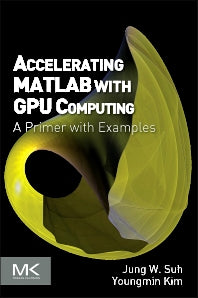Freshly Printed - allow 10 days lead
Couldn't load pickup availability
Accelerating MATLAB with GPU Computing
A Primer with Examples
Speed up Matlab codes by leveraging the power of GPU computing.
Jung W. Suh (Author), Youngmin Kim (Author)
9780124080805, Elsevier Science
Paperback, published 17 December 2013
258 pages
22.9 x 15.1 x 1.7 cm, 0.42 kg
"This truly is a practical primer. It is well written and delivers what it promises. Its main contribution is that it will assist “naive? programmers in advancing their code optimization capabilities for graphics processing units (GPUs) without any agonizing pain."--Computing Reviews,July 2 2014 "Suh and Kim show graduate students and researchers in engineering, science, and technology how to use a graphics processing unit (GPU) and the NVIDIA company's Compute Unified Device Architecture (CUDA) to process huge amounts of data without losing the many benefits of MATLAB. Readers are assumed to have at least some experience programming MATLAB, but not sufficient background in programming or computer architecture for parallelization."--ProtoView.com, February 2014
Beyond simulation and algorithm development, many developers increasingly use MATLAB even for product deployment in computationally heavy fields. This often demands that MATLAB codes run faster by leveraging the distributed parallelism of Graphics Processing Units (GPUs). While MATLAB successfully provides high-level functions as a simulation tool for rapid prototyping, the underlying details and knowledge needed for utilizing GPUs make MATLAB users hesitate to step into it. Accelerating MATLAB with GPUs offers a primer on bridging this gap. Starting with the basics, setting up MATLAB for CUDA (in Windows, Linux and Mac OS X) and profiling, it then guides users through advanced topics such as CUDA libraries. The authors share their experience developing algorithms using MATLAB, C++ and GPUs for huge datasets, modifying MATLAB codes to better utilize the computational power of GPUs, and integrating them into commercial software products. Throughout the book, they demonstrate many example codes that can be used as templates of C-MEX and CUDA codes for readers’ projects. Download example codes from the publisher's website: http://booksite.elsevier.com/9780124080805/
Preface1. Accelerating MATLAB without GPU 2. Configurations for MATLAB and CUDA 3. Optimization Planning through Profiling4. CUDA coding with C-MEX5. MATLAB with Parallel Computing Toolbox6. Using CUDA-Accelerated Libraries 7. Example in Computer Graphics: 3D Surface Reconstruction using Marching Cubes 8. Example in 3D Image Processing: Atlas-based SegmentationAPPENDIX A.1 Download and install CUDA library A.2 Installing NVIDIA Nsight into Visual Studio
Subject Areas: Computer architecture & logic design [UYF], Programming & scripting languages: general [UMX]


